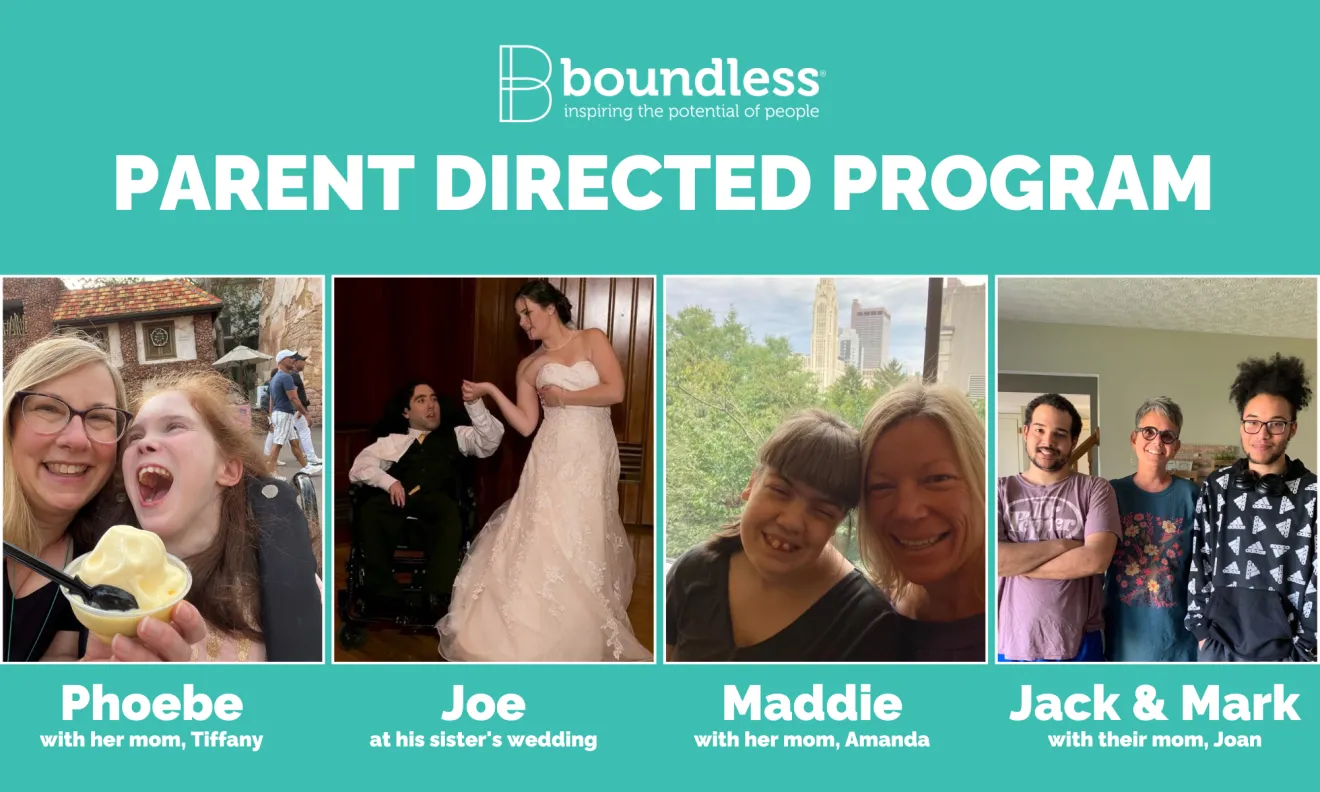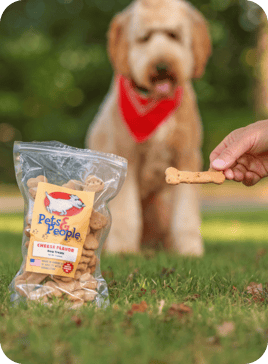Lessons Learned: The Life of a Caregiver
- News

How the Parent Directed Program Helps Families
What is the Parent Directed Program (PDP)?
Burnout, sleep deprivation, and off-the-chart mom guilt are some of the many challenges family caregivers face. According to Family Caregiver Alliance approximately 39.8 million unpaid caregivers, or 16.6% of Americans, provide care for adults with a disability or illness.
When people first enter this role, it can be difficult to know where to start. As time goes on caregivers find support and learn lessons that make life easier. For more than a thousand Ohio families, Boundless offers support through our unique Parent Directed Program (PDP) that allows families the freedom, flexibility, and resources to provide care for their loved ones and get compensated for it. PDP relies on active family members to help manage the number of services needed in the home.
What parents and guardians like most about PDP is it offers freedom and empowerment to individuals and families by giving them the authority to:
- Recruit and handpick their direct service and support staff to recommend for hire by Boundless
- Direct the scheduling of staff at their home, allowing for a great deal of flexibility
We spoke to four PDP parents who have been providing care for their children for many years and we want to share their experiences as encouragement to others.
What are the biggest challenges?
Tiffany Hanna works full-time as a special education teacher and takes care of Phoebe, her 21-year-old daughter, who has severe spastic cerebral palsy and is nonverbal.
“Since I work in this field, when I adopted Phoebe at 6-months-old I entered the situation with my eyes wide open,” Hanna said. But even with her professional background, being a caregiver has changed her life. “I don’t ever sleep through the night. It’s part of being a parent with a child who has multiple disabilities. We have changed our life to care for her. For example, all our friends know they need to come to our house to visit because Phoebe needs to go to bed early,” Hanna said.
Kim Kelly has been a parent, guardian, provider, and advocate for 30 years. Joe, her 34-year-old son, has multiple medical problems due to a very rare condition called GNAO1, which wasn’t diagnosed until 2016. Doctors originally thought he had cerebral palsy. GNAO1 is a degenerative condition which can cause seizures and intense involuntary muscle movements. He’s also nonverbal which limits his communication to eye glances to respond to his caregivers. “Taking care of Joe’s mind and body has been like throwing darts at a moving target,” Kelly said.
Joe received his IO waiver* in 1993. Kelly explained in the beginning she had a hard time because the burden was on her to figure out how the system works. Understanding what an IO waiver is, how it helps, and how to implement it can be overwhelming. “Talking with other families is the best way to learn. There are also Facebook groups where you can find answers, but regardless of your approach, it’s a lot of work. However, once you get things in place, it not only gives the family the additional help they need to care for their loved one, but it truly affords your loved one a life worth living for years to come.” Kelly said.
*The Individual Options Waiver (IO Waiver) is a Medicaid waiver for people who have develop- mental disabilities. Individuals who are eligible can use a Medicaid waiver to stay in their homes and get support, rather than live in an Intermediate Care Facility for Individuals with Intellectual Disabilities.
Amanda Ryther takes care of her 28-year-old daughter Maddie, who has Cornelia de Lange syndrome CdLS, a genetic disorder that causes a wide range of medical challenges. Ryther shared a big challenge for parents is to “loosen the reins a bit.” Accept that you are raising them but it’s okay to allow them to have experiences with someone else. “Others may enhance their life experience even if they do it slightly differently,” Ryther said. “Change is okay.”
Parents trusting someone else to take their child to a community event can be very uncomfortable, and even frightening. “It’s taking me 28 years to get there. it’s a constant process of letting go,” Ryther said.
What have you learned that makes caregiving easier?
Joan Billman adopted two brothers at birth, Jack and Mark, who are now in their early 20’s. When they were born, they both had cocaine and marijuana in their systems. They are also on the autism spectrum. She has been involved in PDP for six years.
“The first thing that helped me was getting connected with the Franklin County Board of Developmental Disabilities (FCBDD) because once you get that support there are so many more resources, help and guidance,” Billman said. “Once you know the system, it’s easier.”
Billman’s sons have greatly improved through the years. “I’m proud of Mark. He now drives, has a job and is succeeding as an adult,” she said.
It is common for caregivers to try to take care of everything on their own, but Hanna said what has helped her the most is learning to ask for and then accept help. “We have had a lot of hospitalizations with Phoebe, so I wasn’t home much. I learned if someone offers to mow your lawn, say okay and thanks! Make a list of things that need done so when people ask what they can do to help you have ideas ready. All those little things add up and make a big difference,” Hanna said.
There is a lot of pressure and stress when you have staff in your home, and it affects the whole family. Kelly shared that finding the right staff is hard, but vital for success. “You have to learn to accept a complete stranger in your home to do intimate things for your loved one,” she said.
Kelly created a book for staff that explained all the details about her son. It included what was expected and what to do to care for him properly. In the past 29 years she has had around 200 people provide care for Joe. “You really are operating an institution in your home. Be honest when you interview someone. Don’t lie by omission during staff interviews because then when the aide comes, if they aren’t prepared for the situation they not only leave your home, but may leave the career field as well,” she said.
Everyone agrees having dependable staff makes life easier. “We’re so lucky we found a full-time person to be with her (Phoebe) for 15 years,” Hanna said. She believes the reason they’ve been so successful with staffing stems from finding and recruiting people who we treat like a part of our family. “If you want staff to stay, treat them well. If you want them to take your child to the movies or to dinner, then buy their ticket and pay for their meals.”
Hiring family and friends you know well is a big benefit of PDP. Not only are you comfortable with your staff, your loved one already knows them, and they get paid for their care and compassion.
How do you take care of yourself while being a caregiver?
Between work, parenting a child with special needs, and taking care of other family members it is generally difficult to find time to take care of yourself. However, not making time to do that is a mistake.
“There’s a huge measure of guilt when we take time away from our loved one,” Kelly said. “But in the last four years I’m working on being a healthy weight and going to the doctor to care for myself.”
Billman shared one of the things that her husband and her really enjoy about PDP is that it allows them to schedule staff so they can make sure to travel as a couple. “Now we can spend weekends away and vacation at the beach,” she said. “People need to think ahead about what happens when your child turns 18.”
Others take care of themselves by finding a hobby and carving out time to do that. Hanna became a beekeeper. “It’s nice because when I go to a club meeting, we just focus on that one topic. No one wants to talk about my kid or my job, and I’m just me,” she said.
In the busyness of being a caregiver it is common for people to be so focused on their loved one that they ignore their own needs, which can lead to a variety of mental and physical health problems.
“Having a conscious awareness of where I am emotionally and physically is really important. We just go, go, go. In order for me to be my best, I have to have boundaries on how much I can put on my plate,” Ryther said.
She recommends staying in tune with you yourself. “Why is my stomach hurting? Why do I have a headache? Have I drunk enough water today? We tend to go all in so it’s important to show up as your best self. If I need 45 minutes to take a nap,; I do it now.” Ryther said she is lucky to have a strong network of other moms who help her when she needs it.
For more tips on taking care of yourself go to University of California San Francisco
To learn more about PDP or if you have questions, please contact Andrea Sandrock, Director, at asandrock@iamboundless.org or call 614-844-3800 ext. 2331





